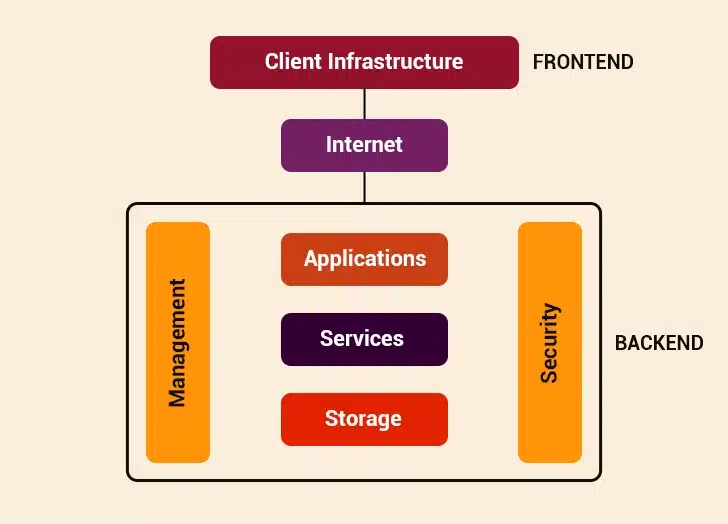Ever wondered where you would store photos and videos if there were no Google Drive or iCloud? Or where would you store all your important files, if there were no Dropbox?
Cloud solutions have fundamentally reshaped the digital world. A majority of companies worldwide now use cloud computing to drive their operations. This adoption has gone beyond a technology trend. Today’s businesses need the cloud to achieve their long-term goals, as cloud-enabled companies see significantly higher growth than their competitors.
Companies that switch to cloud infrastructure gain impressive returns quickly. The flexible nature of cloud computing allows these companies to exploit new technologies. Their teams can use advanced tools for data visualization, trend prediction, and machine learning. Small startups now compete with large established businesses on equal ground.
This blog explores how businesses can realize the potential of cloud technology to boost their growth and create new solutions. It covers implementation plans and new trends that will define cloud computing’s future.
Table of Contents
The Concept of Private and Hybrid Clouds
Differences Between Public and Hybrid Clouds
Getting Started with the Cloud
The Cloud Revolution
Traditional IT infrastructure is rigid, expensive, and challenging to scale. It limits an organization’s ability to respond quickly to dynamic markets. In contrast, enterprise cloud solutions prove to be scalable and cost-effective alternatives, enabling businesses to keep pace with changing needs. This ability to manage data and applications over the Internet via the cloud provides businesses with dual benefits of growth and innovation.
As technology, the cloud is greater than the sum of its parts. This means that the cloud supports more efficient ways of working, opens the door to cloud-native technologies, and enables the development of new AI-ML capabilities.
To better understand the role of cloud computing in fostering innovation and enabling the AI revolution, take a look:
I. Redefining Innovation by Being “Born in the Cloud”
Wondering what “born in the cloud” means? Take the literal meaning— these organizations can leverage the benefits of cloud-native technologies right from the onset since they aren’t burdened by legacy systems. Other than benefiting from agility, scalability, and cost optimization, cloud-born companies are fostering innovation in previously unimaginable ways.
Take the case of disruptors like Uber, Airbnb, or Netflix— all these giants owe their existence to the cloud. These innovators used the capabilities of cloud platforms to transform their entire sectors . Perhaps, this is one of the main reasons why Uber, Airbnb, and Netflix are still in business today.
II. Leveling the Playfield for Startups and MNCs Alike
The high cost and complexity of IT infrastructure posed a significant barrier for startups in the past. Today, things have changed dramatically owing to cloud computing. The powerful tools and technologies that were once used only by multinational corporations are now available to startups. This has levelled the playing field. Startups can now innovate quickly and expand paradigms. They don’t need massive upfront spending on hardware and software. They can test novel ideas, make changes, and grow their business swiftly using the cloud.
Talking of large companies, cloud technology can be used to streamline workflows, reduce costs, and expand operations. Thus, it is right to say that the cloud has become an equalizer for companies of all sizes, from global giants to “startups born in the cloud.”
III. Entering the New Dawn of Operations with Greater Agility and Scalability
Cloud computing has brought businesses a new speed and scalability. The flexibility allows them to launch applications at a pace that was previously unthinkable. They can quickly adapt to the changing market demands by getting resources when they need them. Businesses that use cloud-based solutions are better prepared to grab opportunities and pivot when required.
IV. Synergy Between AI and the Cloud Leading to the AI Revolution
One of the best examples of how the cloud is taking industries by storm is the synergy between AI and cloud computing. AI, which is the fulcrum of modern innovation, uses enormous volumes of data and computational prowess. Cloud’s ability to store and process sheer volumes of data on demand has paved the way for the AI revolution. AI gets its intellect from the cloud, which serves as a storehouse for human-made ideas and information.
V. Leveraging Data to Make Predictions
The predictive power of AI is derived from its ability to analyze past data and trends. AI uses the abundance of data stored in the cloud to forecast future actions, much like how language rules anticipate words in a sentence. The cloud’s unparalleled speed and scalability in gathering, processing, and delivering information fuels these predictive capabilities. Organizations can leverage the computational prowess of the cloud to process large datasets and uncover actionable insights. This ability powers advanced machine learning algorithms and predictive analytics, giving a competitive edge to businesses.
VI. Contributing to Sustainability and CSR Initiatives
Compared to on-premises software, the cloud is an environment-friendly choice. By utilizing shared resources in massive data centers, organizations can lower their carbon footprint and align with growing concerns about sustainability. This helps in conserving energy and positions the company positively when it comes to corporate social responsibility.
CapEx OpEx Considerations for Cloud Migration
The Concept of Private and Hybrid Clouds
Playing a pivotal role in the cloud revolution, private and hybrid clouds are emerging as dynamic solutions catering to unique business needs. Private clouds are a great option for businesses with strict data protection and compliance requirements, given the dedicated and highly controlled infrastructure. On the other hand, public clouds are more general in their utility.
Private clouds guarantee an elevated degree of security and governance by storing data and workloads on-site or in a dedicated cloud environment. Alternatively, hybrid clouds strategically combine the benefits of both public and private cloud resources. Businesses can use the scalability and cost-effectiveness of the public cloud while retaining sensitive data in the private cloud. Hybrid clouds offer a versatile and economical solution for organizations with varying workloads and unique regulatory requirements.
Ultimately, an organization’s particular needs will determine whether to choose public, private, or hybrid solutions,and it is this adaptability that perfectly exemplifies the cloud’s transformative potential in addressing unique challenges. Cloud solution providers can also help them find the right model.
Differences Between Public and Hybrid Clouds
| Cloud Type | Key Features | Best For Businesses with |
|---|---|---|
| Private Cloud |
|
|
| Hybrid Cloud |
|
|
Getting Started with the Cloud
Moving to cloud-based solutions needs careful planning and execution to get the most benefits with minimal disruption. A structured approach will give organizations the power to tap into the full potential of cloud capabilities while managing risks.
1. Audit Systems for Cloud Readiness and Set Goals
The original step should be a complete cloud readiness review to help organizations understand their current IT infrastructure, applications, and operational readiness. This review looks at their existing environment and spots gaps. It also helps decide focus areas based on detailed analysis.
Organizations should:
- Review their current application environments to make sense of cloud adoption
- Check security requirements and compliance needs
- Line up the cloud transformation strategy with business drivers and goals
- Study IT infrastructure components, including network speed, data backup, and hardware
Businesses must define their cloud strategy clearly at this stage. They should set realistic timelines and figure out what resources they will need.
2. Choose the Right Service Provider
The choice of cloud provider will substantially affect how well the migration works. You should look at the provider’s past record, financial stability, and experience with similar workloads. The vendor’s service offerings should match your organizational needs.
Before selecting a provider, study factors such as:
- Service reliability
- Security infrastructure
- Support and billing transparency
- Geographic presence relevant to your user base
3. Pilot Testing
Before committing to full implementation, create a proof of concept to verify the feasibility and potential benefits of migration. This controlled test environment helps spot potential issues early. It also allows your teams to refine the migration strategy.
Proper testing alleviates risks, identifies problems, and confirms that the cloud environment meets organizational requirements. Teams should document the changes needed for migration during this step. They should also plan enough time for application cutover.
4. Migrate Data and Applications
Migration should follow a clear plan for each application, workload, and instance. Rather than trying one massive migration, work in manageable phases. Confirm each application works in the cloud before transferring the next.
Most companies use high-capacity networks to move their data center resources to the cloud. If strong networks aren’t available, teams can transfer resources using disks physically shipped to the provider. Data migration also remains critical. If data becomes inaccessible during migration, it could affect your business operations.
Each workload should be tested to see if it runs properly in the new environment before the next one is moved. There should be a synchronization mechanism to update the source data during the migration process.
5. Use Tools for Monitoring
Set up cloud monitoring solutions after migration to track performance. Cloud monitoring tools collect data that help spot issues and patterns. They show information about your infrastructure, applications, and services. Organizations should pick monitoring tools that can send alerts, have customizable dashboards, and connect easily with other systems.
Cloud monitoring helps you use resources better and spot ways to save money. It also optimizes your existing cloud setup. This ongoing fine-tuning gives you the most value from your investment while keeping performance high.
The Changing Landscape of Managed Cloud Services: What Enterprises Need to Know
Trends Shaping the Future of the Cloud
The world of cloud computing keeps evolving fast. State-of-the-art developments are ready to change how companies use technology for business success. These new trends are not just technical upgrades. They represent opportunities that will shape how companies compete in the years ahead.
I. Growing Demand for Artificial Intelligence
Artificial intelligence has become an essential component of modern cloud systems. The global market value of AI will reach $4.8 trillion by 2033. AI’s growing role in cloud management has significantly contributed to this growth. AI-based analytics and automation now help allocate computing resources, spot failures before they happen, and handle workloads better.
The combination of AI and cloud helps create applications that were once just ideas. AI makes workflows smoother while cloud computing offers the processing power and storage that AI needs.
II. Industry-Specific Cloud Platforms
Specialized industry solutions are the future of cloud computing. These platforms combine software, hardware, and infrastructure capabilities to meet specific industry needs. Gartner tells us that by 2027, over 70% of enterprises will use industry cloud platforms to speed up their business initiatives.
These platforms turn basic cloud technology into complete business solutions. They offer modular, adaptable architectures with industry-specific features built right in. The result? Companies can adopt cloud technology much faster because the hard work of customization is already done.
III. Sovereign Clouds
Sovereign cloud solutions have emerged as data regulations become stricter. Digital sovereignty laws now exist in 137 countries. Businesses demand greater control over their data storage and processing. Adoption is particularly strong in Europe, where 37% companies already use sovereign cloud solutions and many others plan to implement them soon.
Sovereign cloud covers three important areas: data sovereignty (laws apply where data originates), operational sovereignty (access to infrastructure), and digital sovereignty (control over digital assets). Recent global events have shifted priorities. Today, most tech leaders in and outside Europe emphasize sovereign cloud solutions.
The Bottom Line
Cloud solutions have changed how businesses run and scale. They serve as powerful tools for companies that want to expand and create breakthroughs. Cloud technology creates profound business outcomes, from faster revenue growth to improved operations. Companies secure competitive advantages through improved responsiveness, not just cost savings.
Cloud technology helps companies grow faster, become more profitable, and adapt better to market changes. It also makes advanced capabilities accessible to more people, which lets businesses of any size compete fairly. Small startups now use the same powerful tools and infrastructure that were once limited to large enterprises with hefty IT budgets.
Moving to the cloud has its challenges, but the benefits are nowhere close to the risks. Companies using cloud solutions are better prepared to lead in the modern world’s unpredictable business climate. Cloud technology provides the foundation necessary for enduring growth and innovation.
Companies that use cloud solutions smartly will, without doubt, stay ahead of the competition. The cloud journey might look complex initially, but with sound planning and execution, businesses can discover remarkable opportunities in today’s volatile markets.







